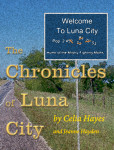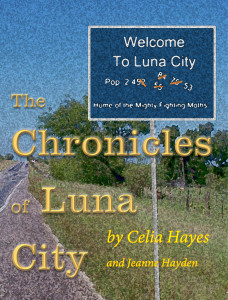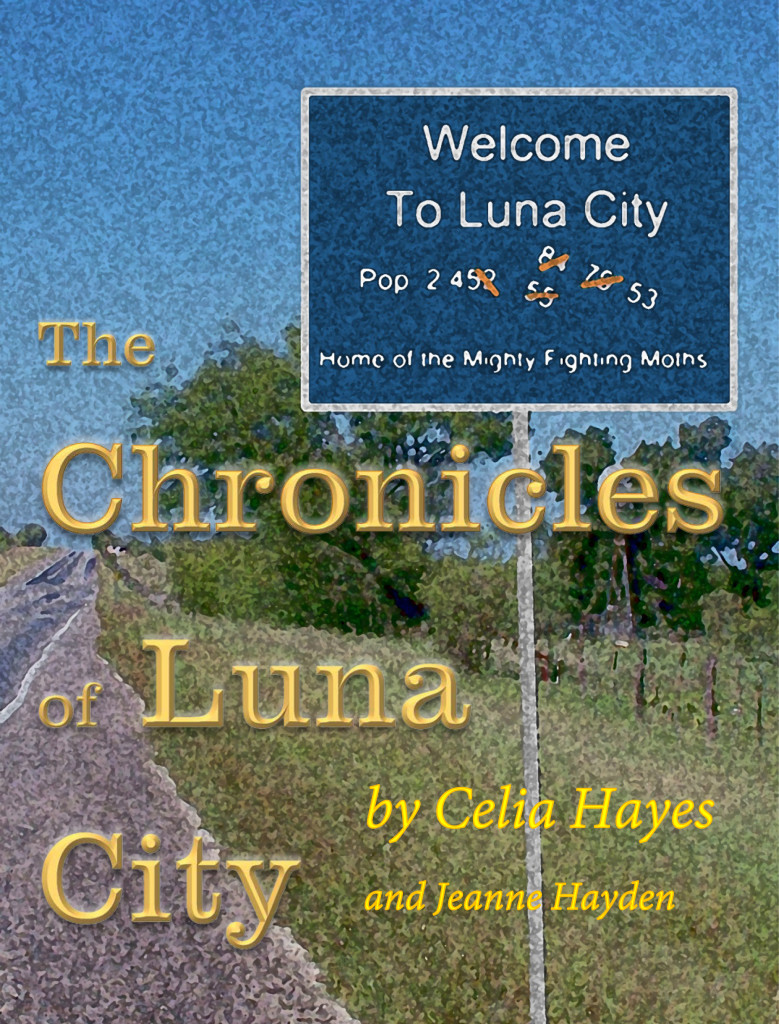(Yes, I’ve been able to do another short chapter of the Chronicles of Luna City, wherein a handful of local citizens – Dr. Wyler the veterinarian, Chief of Police Joe Vaughn, CPA Jess Abernathy and Sefton and Judy Grant, owners of the Age of Aquarius Campground and Goat Farm – make the acquaintance of the mysterious Englishman who has appeared in Luna City.)
“Oh, f__k!” growled Joe Vaughn, as he unsnapped the strap on his holster.
“Jumping Jesus Key-rist on a pogo-stick!” Dr. Wyler raised his reading glasses and squinted across the raddled meadow that was the campground at the frantically leaping, sun-browned and vaguely human figure leaping and twisting like an agonized gazelle on the riverbank.
“Oh, dear,” said Judy, wringing her hands. “I think he found a fire-ant nest the hard way.”
“Oh, sh*t!” responded her husband. “Judikins, you know we don’t wanna use all those artificial insecticides on the property … but for the happiness and safety of our visitors …”
“Seftie, sweetie,” Judy replied, with the most obdurate expression that her otherwise sweetly bland countenance could muster, “We agreed … no inorganics.”
“But fire-ants …” Sefton protested in a half-hearted way, as Dr. Wyler snorted contemptuously, “You morons, everything is organic; if you are going to pretend to be scientifically knowledgeable, at least get the terminology down right.”
“Cool it, Doc …” Jess whispered, warningly. The Grants were also her clients. And Luna City was a small place, in which conventional courtesies greased social interaction among those with wildly differing social and political philosophies to achieve a sometimes startling degree of amity when it came to outsiders.
“Well, sports fans, I think we found the missing guest,” Joe Vaughn re-snapped the strap across the top of his side-arm holster, regarding the empty campground with a particularly sour mien. “And a damn-good broken-field runner – pity he can’t play for the Moths next season.”
“Looks like he will fit in here real well, Seftie,” Judy commented, as the naked runner galloped across the intervening meadow at top speed. He was being chased by a very small Nubian goat, bleating enthusiastically. “He has already made friends with one of Rigoberta’s babies! How sweet!”
The naked runner arrived, just short of the interested cluster of observers, his chest – clearly visible to them all – heaving like a bellows – and his eyes showing white all the way around.
“What the blooming hell!” he gasped. “Where am I? What is going on, and why is this … this thing following me. I couldn’t find the dunny in this benighted place … and I woke up … oh, flaming hell!”
He swatted ineffectually at his thighs and nether parts. “Get them off me! Flaming hell, that stings!”
“He found the fire ants,” Joe Vaughn announced to the world at large. “Jesus, sport – get a grip and put on your pants – there’s ladies present. You’re in Luna City, Texas.”
“I don’t think I am seeing anything I don’t already know about,” Jess replied, with an edge in her voice which unaccountably caused Joe Vaughn to turn faintly red, underneath his tan.
“Aloe vera,” Judy Grant announced, with a great deal of satisfaction. “Seftie … you know where my aloe vera patch is … can you be a sweetie and break off a length – about as long as your hand. It’s the least we can do, to make up for the fire ants…and there’s a bottle of witch hazel under the sink in the workroom – bring that, too.” As her spouse trotted away obediently, she regarded their visitor with appreciative interest.
“Fire ants!” The naked runner had recovered control of his voice. “The ants of hell, escaped when the hatch was open! Is it too much to request that you can blast them from orbit, as it were?”
“No can do, sport,” Joe Vaughn replied, with a notable lack of sympathy. “Your hosts at the Age of Aquarius Campground and Goat Farm believe in organic solutions to organic problems.”
“Everything is organic …” Dr. Wyler sized up the situation with the analytical eye of long practice and opened his medical bag. “And compared to screw-worms and bot-flies, fire ants are a walk in the park. Painful, but a walk in the park. You don’t have any open wounds on you, do you, son? Aside from the ant bites.” He soaked a wad of cotton gauze with rubbing alcohol, and handed it to suffering patient. Meanwhile, the small goat continued to frolic around him, occasionally emitting a plaintive baaaa and darting at his knees.
“Let it go, Doctor Wy,” Jess hissed, as Dr. Wyler continued, “Never mind the witch hazel – just wipe ‘em off. And put on some pants, as the Chief said – you’re embarrassing the horses with delusions of adequacy.”
“Your papers say that you are Richard Astor-Hall,” Joe Vaughn thoughtfully examined the skyline, as the Grant’s guest swabbed the gauze over his mid-section and buttocks, front and back. “If so – then who is this Rich Hall person? I’ll wait on an answer, until whichever you are puts on some pants.”
“Appreciate the delicate consideration, my dear chap,” the Grant’s guest replied, with a great deal more urbanity than any of the other two men present could have mustered under the same circumstances. In a few moments, Sefton came panting down the path from the Grant’s eccentric and rickety home-built yurt with tree-house and cave additions, bearing a length of thick green cactus spear in one hand, and a gallon jug in the other. The naked guest vanished into the depths of the near-derelict Airstream. The small goat waited, forlorn, at the foot of the steps into it, restrained by Judy, who called into the trailer before the door banged shut,
“Just rub the cut end over the worst of the bites … it’s organic and healthful …”
“Everything…” Dr. Wyler snarled, and Jess reminded him, sotto voice, “I said – let it go, Doc.”
By mutual consent, everyone moved to the battered picnic table, where a small live oak afforded a patch of shade, relief from the blazing sun which was already making the reflected heat shimmer over the hoods of Joe Vaughn’s cruiser and Dr. Wyler’s pick-up. They waited, in more or less companionable silence, for the odd Englishman to emerge from the Airstream.
“I meant to ask,” Jess said to Judy, “For a quart of that honey, if you have any – and Dad is out of that rosemary-flavored soap that he likes. I know it’s not your market Saturday, but I thought I would just ask.”
“Not a problem,” Judy smiled, beatifically. “I’ll bring it around this afternoon. Just credit the account, when you get to it, sweetie.”
The door to the Airstream opened, and the Englishman emerged – to Sefton and Judy’s slight yet obvious disappointment, clad somewhat decently in a pair of crumpled draw-string pants and a wife-beater undershirt. Neither of those garments seemed particularly fresh from the laundry – but the only being who seemed to care was the baby Nubian goat. It bleated in happy joy when the Englishman sat down, and nuzzled against his thigh.
“Why is that bloody creature doing that?” he asked, after a moment.
“Che likes you,” Judy replied, happily oblivious to the elbow that Jess shot into Dr. Wyler’s ribs as soon as the old veterinarian opened his mouth. “You must have a pure soul. Animals are sensitive to these kinds of things.” Jess applied the elbow again.
Dr. Wyler subsided, muttering, “Tell that to old Gonzalez’ piebald mule in ‘53 – a broken rib and half a dozen stitches …”
Joe Vaughn cleared his throat. “You were saying … who really is Rich Hall?”
“A phantasm,” the Englishman answered, sadly. “An ephemeral creation of the star-making machinery…”
“Behind the popular song,” Judy Grant brightened. “So – you’d rather be a free man in Paris?”
“There are a lot of people looking for that special paradise,” Sefton nodded in perfect comprehension, a lugubrious expression on his face. “Darned few ever found it here, though.”
“Seftie, sweetie – don’t be a bummer. It wasn’t our fault,” Judy explained to the world at large, and Joe Vaughn cleared his throat again. The very sound had a dangerous hint in it. The Englishman took his cue to continue with the deftness of a professional.
“A character in a play put on for the amusement of the masses, a manqué … and a fraud. Rich Hall … is a puppet. Raised in a sink estate, the oldest son of pair of alcoholic benefits scroungers …”
“That’s your problem, right there,” Dr. Wyler glared sideways at Jess before she could apply the elbow again. “Shush!” she hissed, and the strange Englishman continued as if there hadn’t been an interruption. “… who learned to cook out of cookery books from the local lending library, in order to feed his ten younger brothers and sisters, all of whom would have starved, and been taken into care, otherwise…”
“A touching tale,” Joe Vaughn observed, in a caustic tone of voice.
“Yes, I thought so,” the Englishman agreed, rather smugly, “As did the publicists for the show; they ate it up as if it were the finest flaugnarde imaginable, and so did the public.”
Judy exclaimed, “How tragic! This should not properly happen … where were the child protection authorities? Someone should have done something!”
The Englishman sighed, heavily. “No, dear lady – it is not quite what you assume; were you not paying attention when I said that Rich Hall is a mere character, a creation put on for the masses? To continue – nearly a decade ago, he placed second in one of those popular television cooking competitions. Subsequently, he launched a career of his own, starring as a celebrity chef and all-around arsehole. He’s not a nice person, you see,” he added with an air of confiding in them all. “He throws tantrums on camera, flamboyantly dates other celebrities, generally makes a fool of himself in public … drinks too much, drives too fast, is rude to his friends … I can’t stand the git any more, myself. I would rather be a free soul in Paris. Or anywhere, really.”
“But you are …” Judy Grant began, quite baffled, and the Englishman shook his head, mournfully.
“No,” he answered, with a tragic sigh. “I am merely Richard Astor-Hall – the only child of well-to-do professionals. They lived in Bickley when I was growing up and now in the South of France – in a villa with a vineyard that I bought for them. I attended Charterhouse, and when I finished there, my parents paid for a full course of study in Paris at Cordon Bleu …”
“Nice!” Dr. Wyler applauded. He had already assessed the Englishman with the same eye that he brought to all of his encounters.
“So – it was all a pretense…” Judy’s face brightened, and the Englishman nodded. “What should we call you then?”
“Astor-Hall, if you simply must be formal,” he replied. “But simple Richard will do.”
“So, that’s my job done,” Joe Vaughn rose from his seat with some difficulty. He leaned across the table to extend a hand to Richard Astor-Hall. “Gotta be rolling, folks. Nice to meet you, Richard; welcome to Luna City – it’s a small place, but most people love it, or they get used to it after a while. Let me know if there is anything I can do.”
“There is one thing, officer,” Richard Astor-Hall ventured. “If there should be any inquiries after Rich Hall … from anyone at all.”
“Rich who?” Joe Vaughn grinned. “Never heard of him. G’day, ladies, Doc, Sefton. Crime waits for no man…”
He sauntered back to his cruiser, fired it up, and circled the cruiser around to the road again, and was soon only visible as a cloud of settling dust in the wake. Dr. Wyler spoke first.
“Best see to Azúcar, then – I ain’t getting any younger. I got a question for you, Richard … what is it you want to do with yourself, now?”
“Cook for people,” Richard replied, at once. “That’s it, mostly.”
“Then I have a business proposition, once I’ve seen to business here,” the old veterinarian also rose – like Joe Vaughn, untangling himself from the picnic table bench with some difficulty, – and gathered up his medical bag. He looked at the younger man for a long moment. “Masks, young fellow – we all wear ‘em, to one degree or another. But a mask that’s not got the slightest resemblance to what you really are, underneath is a mask that don’t fit – best take it off, and try another before it smothers you under the weight.”
“I will consider that, sir, and thank you,” Richard looked down at the tabletop. “I will be more than happy to consider your business proposition – and your advice about masks.”





Recent Comments